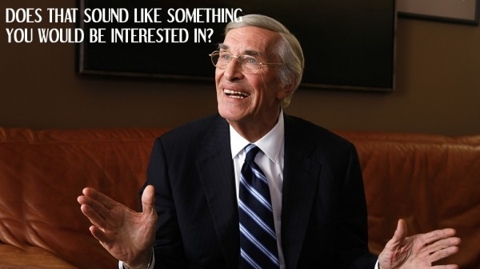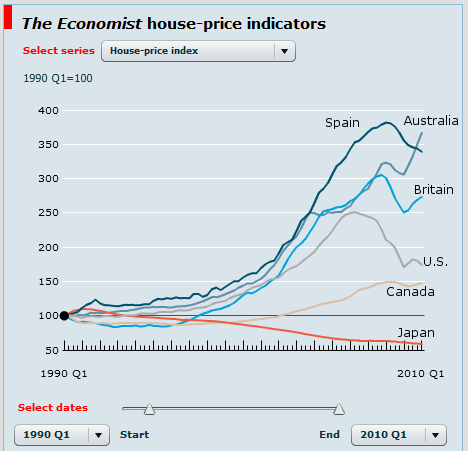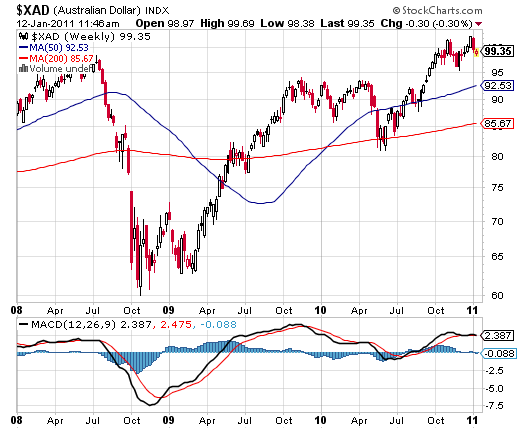Full article here
Yes it's bearish, so if you don't like it then don't read it. Just a nice overview of where we're at (and yes I know this doesn't apply to the whole country)Today we're going to have some fun. We're going to play a game. The game is called “Mystery Country.” It was adapted from our Predictions for 2011 newsletter and it's an easy game to play.
What if I told you about a country…
- …that is still at the peak of a housing bubble, perhaps the last housing bubble on earth? It’s a country where the median home price in its major metropolitan areas is about eight times the median income.
- …that has an economy heavily leveraged to the commodity boom, with upwards of 30% of GDP driven by commodity exports to growing, resource-hungry nations like China and thus highly susceptible to deflationary shocks or slowdowns.
- …with a private sector debt-to-GDP among the highest of all nations?
- …that is currently rocking a planet-leading 160% household debt-to-income ratio from people using their homes as ATMs exactly the way that we did in the United States.
- …where many of the largest banks are once again trading near all-time highs? Where these banks have been actively pushing for higher leverage ratios and looser mortgage standards?
In the words of Bob Ryan:
Yes Bob, that does sound like something I would be interested in. Interested in shorting!
The answer to Mystery Country is “Australia.”
If you’re looking for a prediction that is waaay outside consensus, then I think that Australia is a disaster waiting to happen. It is a bubble in search of a pin, in modern parlance.
And nobody — I mean nobody — is talking about this right now. The reason, of course, is that Australia is booming. They are digging very valuable stuff up out of the ground as fast as they can and selling it for ever-higher prices. Unemployment is low and their currency is strong.
When you’re looking for assets to short, you don’t go looking for the ones that have already fallen like a rock. You find the ones that have legitimate fundamental concerns and are trading well above where they should be. Shorting the U.S. housing and stock markets in 2006 or 2007 seemed totally nuts; but that was the time to gear up for that trade. There were major problems afoot but everyone thought the strength would continue forever.
Have a look at this chart in case you object to the claim they’re in a housing bubble:
(Click charts to expand)
That’s a bubble.
And if we’ve learned one thing from housing bubbles in the last couple decades it’s that they are nasty. I mean, nasty!
Japan is still mopping up the bloodshed from its epic real estate collapse twenty years ago. In the U.S. the housing bubble catalyzed a little financial crisis. Several years after the fact, we’re still coming to terms with the knowledge that we’ll be struggling with the fallout from our real estate bubble for some time to come. Spain had an even bigger housing bubble than we did and they’re paying the price with 20% unemployment right now. The United Kingdom is still on the way down and everybody knows it will be ugly over there for a while. Iceland, of course, blew up in spectacular fashion, erasing generations of wealth in the blink of an eye. The housing bubble and bad banking standards were the primary reasons why.
So to find a country that’s still locked in the irrational throes of real estate ecstasy is something of a treat. It’s a movie we’ve seen many times before. We know the ending.
Another Trade for the Decade
The Chinese real estate bubble gets all the publicity now, but theirs is concentrated in a handful of major cities. Australia’s housing bubble is centered in the major metropolitan areas too, but the problem is that this represents most of the population. The five largest cities (Sydney, Melbourne, Brisbane, Perth, and Adelaide) account for 61% of the entire country’s population! When you add Canberra, Hobart, and the Gold Coast, which have also seen stratospheric increases in home prices as well, that number gets closer to 70%. Basically, this is a bubble that affects the entire nation.
Today the story with Australia is that it’s a roundabout way to play China. I think that playing China directly is a better way to play China. But if you’re one of those China nonbelievers, then I think that shorting Australia might be a better way to short China than shorting China directly.
I know that was a little confusing, so let’s try this: in absolute terms, the probability of Australia wiping out because of their housing bubble is high. I think it’s much higher than China cooling off for any significant length of time. So Australia has a long-term, near-inevitable risk going against it (housing bubble) plus a variety of short-term cyclical risks (China slowdown or other economic hiccup).
Here’s another awesome Trade-of-the-Decade: short Australia and get long China. You can implement that with each countries’ assets and companies — get long something like the iShares China 25 Index Fund (FXI) or S&P Asia 50 Index Fund (AIA) over the MSCI Australia Index Fund (EWA).
You can also try specifically shorting the banks, National Australia Bank (NABZY.PK), Australia & New Zealand Banking Group (ANZBY.PK), or Westpac Banking Corporation (WBK). We all know that banks feel it most in the aftermath of a housing bubble and it’s possible that Australia may not have the political will or economic capacity to bail them out and zombify them the way that Japan did and we have done in the U.S. There’s a good chance that many of their banks just fail.Seriously, go look at their bank’s webpages and compare them with the ones in this country. There’s an “investment property” section featured prominently on every Australian bank’s website. Investment properties! Remember those? In Australia you can get special “introductory rates” and “lines of credit” as well as the “60 minute home loan” and “customized mortgages to meet the needs of the self employed.” It’s madness!! I haven’t seen anything like that from Bank of America (BAC) or Wells Fargo (WFC) since 2005. Over here we have the 60 day home loan application and good luck getting a mortgage in this country if you're self-employed.
Look, I’m not a bank analyst. I’m just a guy with a barely-above-average knack for identifying large scale patterns and cycles and who has spent more time than any sensible individual should have at the Australian Bureau of Statistics. I have no idea if these Australian banks are technically insolvent or not. All I know is that they’re doing exactly what U.S. banks were during the peak of our own real estate boom (and Japan’s, and Europe’s, for that matter). And I know how that ended up for those banks. I’ll let someone else get hung up on the details.
So do with this suggestion what you will. Personally, I have nothing against Australia.
Other ways to play it
Incidentally, this long China / short Australia trade also works for the currencies. The Aussie Dollar is way strong right now with high interest rates demand for their exports as robust as ever, and everybody knows the Chinese RMB is artificially undervalued.
The best way to execute this is in the Forex markets but you can try the ETF route too and buy the CYB over the FXA.
There’s an added bonus with this trade too. Since these two markets are somewhat tightly linked, this trade probably won’t have the volatility that other global relative value trades will. Shorting Australia is a semi-hedge for getting long China. The correlation between FXI and EWA is at around 0.8 right now. At some point that linkage will erode. Long-term, China has a lot more going for it than Australia and there are countless scenarios where China does well and Australia doesn’t. I have a much harder time coming up with scenarios in which Australia wins and China doesn’t.
This isn’t necessarily something that plays out in 2011. I’m a terrible market timer. But it’s time to start talking about it. The Australia real estate bubble won’t officially end until greater fools stop paying ever-higher prices and who knows when that happens.
Humans are funny creatures. Like moths to a flame, we not only ignore the danger but are drawn even closer to it.
Disclosure: I have no positions in any stocks mentioned, and no plans to initiate any positions within the next 72 hours.
- Forums
- Property
- the last epic bubble













